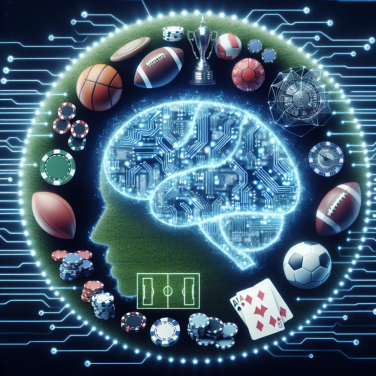Advancements in Machine Learning: Enhancing Prediction Accuracy in Sports Wagering
The integration of machine learning into the realm of sports wagering has revolutionized the industry, allowing for an unprecedented level of prediction accuracy. As artificial intelligence continues to evolve, the field of sports betting now employs sophisticated algorithms that can process vast quantities of data to inform bettors and enhance their decision-making.
One of the most significant breakthroughs has been the development of predictive models that incorporate real-time data. Machine learning algorithms are now capable of analyzing live game statistics, player performance, weather conditions, and historical data to adjust the odds instantaneously. This not only offers a competitive edge to bettors by providing the most current information but also allows sportsbooks to set more accurate lines.
Another advancement in machine learning is the use of neural networks, particularly deep learning techniques. These algorithms simulate the way the human brain operates and are incredibly efficient at recognizing patterns and correlations in data. By employing neural networks, sports wagering systems can adapt to new trends and outcomes, improving their predictive accuracy over time. This adaptation is critical in sports where variables are continually changing, such as the emergence of new talent or the implementation of new coaching strategies.
Natural language processing (NLP) is another exciting development. This facet of machine learning interprets and understands human language, which is very useful in analyzing news articles, expert opinions, and social media for insights into team morale or player conditions that are not reflected in numerical data but still significantly impact game outcomes.
Additionally, reinforcement learning, a type of machine learning that is particularly adept at making a sequence of decisions, is paving the way for the creation of more sophisticated betting strategies. Algorithms that use reinforcement learning are trained to make decisions that maximize cumulative reward, which in sports betting is the financial gain. This enables the development of models that can learn optimal betting strategies through the trial and error of placing bets with various odds and stakes.
An imperative aspect of enhancing prediction accuracy is the personalization provided by machine learning. Machine learning algorithms can be designed to learn from the individual bettor’s history, preferences, and betting patterns. This level of customization means that the bet is not just tailored to the general public but to the individual’s style, leading to more informed and potentially successful betting choices.
Furthermore, fraud detection and risk management have been greatly improved with machine learning. By analyzing behavior patterns and betting anomalies, AI can identify suspicious activities that may indicate fraud or match-fixing, thereby preserving the integrity of the sports and betting industries.
Read also:
Top 5 MMA Fighters Backed by Crypto Giants: Who's Earning Big?
Unveiling AI's Role in Revolutionizing Sports Betting Strategies
Artificial intelligence (AI) has emerged as a game-changer in the field of sports betting, offering unparalleled advantages to both bookmakers and punters alike. By uncovering the nuances of AI's influence on wagering strategies, we can better understand the landscape of modern sports gambling.
One of the most significant contributions of AI to sports betting is the ability to process vast amounts of data at speeds and with an analytical rigor far beyond human capability. Traditionally, bettors relied on a combination of statistical data, personal intuition, and historical performance to make informed betting decisions. AI revolutionizes this approach by utilizing machine learning algorithms and data analytics to dissect past games, player performance variables, and countless other factors that influence the outcome of sporting events.
These sophisticated algorithms create predictive models that can forecast game results with a higher degree of accuracy. For sports bettors, AI-driven models can identify value bets, where the odds offered by bookmakers do not reflect the true probability of an event. By exploiting these discrepancies, AI-guided bettors can secure a competitive edge which, over time, can translate into substantial profits.
Moreover, AI enhances risk management by tailoring bet sizes and strategies based on the calculated probability of outcomes and the bettor's historical success rate. This personalized approach ensures a more disciplined and systematic betting structure, as opposed to the emotional or impulsive decisions gamblers are known to make.
Bookmakers also harness AI's power, using it to set more accurate odds that factor in an immense array of variables, ranging from player conditions and team dynamics to weather forecasts and even social media sentiments. By doing so, they maintain their profitability while offering odds that can withstand the informed speculations of seasoned bettors.
The integration of AI in sports betting is also paving the way for real-time betting strategies. AI systems can analyze the flow of the game as it happens, adjusting the odds and identifying profitable betting opportunities on the fly. This dynamic approach to betting, often referred to as live or in-play betting, adds a thrilling dimension to sports gambling that was previously unattainable.
Furthermore, the rise of AI in sports betting is not without its ethical considerations. There is ongoing debate regarding the fairness and impact of using AI in this domain, particularly with regards to the potential for creating an uneven playing field where those with access to advanced AI tools may have a distinct advantage over the average bettor.




